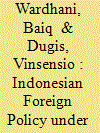| Srl | Item |
| 1 |
ID:
192240


|
|
|
|
|
| Summary/Abstract |
Since independence in 1945, Indonesia has managed to carry out its foreign policy according to a unique doctrine described as “independent and active” (bebas dan aktif). To be independent means that Indonesia does not side with world powers, while being active means vigorously carrying out peaceful policies and actively participating in the peaceful settlement of international issues. The doctrine is not a neutral policy but does not align and bind the country with the superpowers or any military pact. Instead, being independent and active primarily serves the national interest while allowing the Indonesian government to collaborate with other nations. However, the doctrine’s implementation has varied according to the different interpretations of successive presidents. This paper explains Indonesia’s independent and active foreign policy during President Joko Widodo’s presidency. It contends that while the doctrine has continued to underlie Indonesia’s foreign policy, the formulation of President Joko Widodo’s foreign policy is unique in its practical approach, prioritizing the national interest and the domestic advantages of foreign relations. In the president’s worldview, foreign policy has been instrumental in promoting the nation’s development.
|
|
|
|
|
|
|
|
|
|
|
|
|
|
|
|
| 2 |
ID:
173989


|
|
|
|
|
| Summary/Abstract |
As Indonesia’s economy gradually improves, the government has been actively promoting its horizontal cooperation among developing countries by playing a prominent role as a non-DAC (Development Assistance Committee) provider. Though the country has been receiving aid over the past two decades, it has also been providing to other developing countries in the Pacific region. However, Indonesia’s relations with these countries face contention due to it being perceived as “big and aggressive.” This is evident in its decision to oppose the independence of Papua. After decades of seeking good relations, Jakarta has opened its Eastern door by creating a closer link with the Pacific countries through the provision of aid. As it moved from ignorance to awareness, Indonesia’s approach was aimed at solving domestic problems related to its national integration and territorial integrity in the east, particularly the issue of Papuan independence. The country made use of aid as its primary diplomatic tool in its “Look East” policy. This paper investigates the extent to which this policy has been instrumental in rebuilding, restoring, and improving Indonesia’s image among Pacific countries. It argues that the ethnic dimension is one of the critical determinants in diplomatic relations, and ignorance could lead to its failure. Furthermore, it shows that the use of aid has resulted in a constructive impact that has been evident in a decrease in support for Papua separatism in the South Pacific region.
|
|
|
|
|
|
|
|
|
|
|
|
|
|
|
|